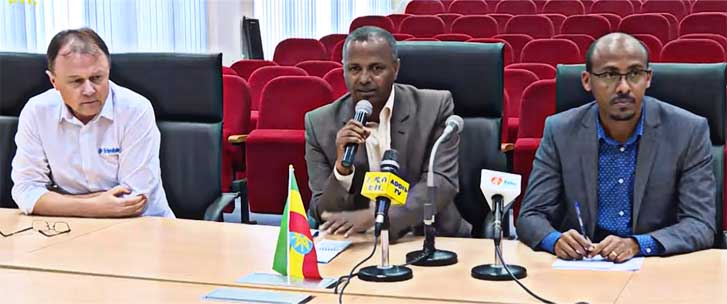
Radar | Jul 30,2022
Jul 25 , 2020
By GELILA SAMUEL ( FORTUNE STAFF WRITER
)
The new procedure that obliges traders in the import-export business to secure permits via the celebrated Ethiopian Electronic Single Window Service (eSW) is now fully operational.
The portal, which connects 16 major regulatory agencies, enables traders to submit documentation and receive electronic import and export permits through a single-window submission. The system was launched this January, but it became mandatory for traders as of July 8 following a request from the Customs Commission to the National Bank of Ethiopia (NBE).
The Commission sent a letter to the central bank requesting the enforcement of the eSW system through banks to decrease the physical contacts as a means to contain the spread of Novel Coronavirus (COVID-19).
In the process, the traders have to go to the premises of the Commission to get a username and password after producing their business license. With their account, the officers of the Commission feed sales contract agreements, proforma invoices and letters of credit into the system for the exporters, as well as insurance certificates, proforma invoices, certificates from the regulatory agency and undertaking letters for importers, into the system.
All this data will be scrutinised by each of the 16 respective regulatory agencies before the issuance of the permit. The entire process is said to take three days. Out of the 16 government bodies, four of them - Oromia Islamic Affairs, the Ethiopian Food & Drug Authority, the Ethiopian Chamber of Commerce & Sectoral Association and the Ethiopian Conformity Assessment Enterprise - are not giving service.
However, after the death of the famous Afaan Oromo singer Hachalu Hundessa at the beginning of this month followed by a nationwide internet shutdown, a hiccup occurred when issuing a permit through the new system online.
Traders from all over the country started flocking to their respective banks to get on the new system and run through their respective permits. This led to heavy traffic from business people in different parts of the country at banks.
"This could have been avoided, because even with the internet shutdown, traders can access the system since it is locally hosted," said Robel Tesfaye, programme director for the Ethiopian Single Window Service programme.
The project office of the new system, which is located at the headquarters of the Ministry of Revenues, started taking on the load of customers from the banks. The project office gives two services, creating a username and password for traders to be registered in the system and processing application permits for exporters and importers.
"This is to give confidence to the traders to have trust in the system but also to make them familiar with the new system," said Robel. "But this can be done through their mobile phone or computer at home."
Despite the intentions of making the system an obligatory procedure due to the pandemic, the project office is filled with a queue of people in close proximity who are confused and frustrated.
"This is the fourth day I'm in line just to get the username and password," said Tizazu Adela, general manager of Bete Meri Trading, which has been importing electronics for the last 10 years. "There is no chair or window open for that matter."
In order to decrease the pressure, the Commission had sent another letter to the central bank to effectively enforce the service to be provided through the respective banks at the end of last week.
"By this week, we expect lesser pressure as banks will serve their own customers," said Robel.
As of July 24, the system has registered 3,786 traders from the expected 150,000 traders. And it has run 6,306 applications through the new system.
This is an important system as it will bring the country closer to international trade standards, according to an international trade specialist at the International Finance Corporation.
"Refining trade initiatives like the new system will also help to increase the ease of doing business in the country," he said.
Ethiopia currently stands at 159 out of 190 countries in the World Bank's Ease of Doing Business 2019 report. The nation has slipped two positions from the previous year and is down 55 positions from its best-ever ranking in 2011.
The eSW, which was started in 2012, had a total budget of 32 million dollars. In addition to this, earlier this year the Korean Government also vowed to give 7.2 million dollars in kind for the advancement of eSW.
Phase one of the system was designed by Customs UNI-PASS International Agency (CUPIA), a South Korean firm that focuses on the development and operation of e-customs and single window systems as well as providing customs modernisation consulting services to customs authorities around the world for more than a decade.
The Korean company secured the project three years ago without a bidding process after a series of failures in the bidding process. The World Bank Group's International Finance Corporation wing has also assisted the government in designing a blueprint including functional and technical architecture and business process reviews for the new system.
The second phase, which is in its early steps, plans to interlink 22 additional regulatory agencies, including the Ethiopian Shipping & Logistics Services Enterprise.
In the introduction of new systems like this, the key point is creating awareness, consensus with users, training and acceptance to avoid these kind of issues, according to Salehu Anteneh (PhD), associate professor for information systems and IT doctoral director at Addis Abeba University's College of Business & Economics.
Salehu suggests there is also going to be a cut off point in the introduction of new systems, and this is likely a learning curve; thus, business people will get used to it at some point.
PUBLISHED ON
Jul 25,2020 [ VOL
21 , NO
1056]

Radar | Jul 30,2022

Fortune News | Jul 15,2023

Radar | Jun 29,2019

Fortune News | May 16,2020

Fortune News | Aug 03,2019

Radar | Aug 04,2024

Fortune News | Mar 27,2021

Radar | Mar 06,2021

Fortune News | Oct 03,2020

Radar | Jul 11,2021

Dec 22 , 2024 . By TIZITA SHEWAFERAW
Charged with transforming colossal state-owned enterprises into modern and competitiv...

Aug 18 , 2024 . By AKSAH ITALO
Although predictable Yonas Zerihun's job in the ride-hailing service is not immune to...

Jul 28 , 2024 . By TIZITA SHEWAFERAW
Unhabitual, perhaps too many, Samuel Gebreyohannes, 38, used to occasionally enjoy a couple of beers at breakfast. However, he recently swit...

Jul 13 , 2024 . By AKSAH ITALO
Investors who rely on tractors, trucks, and field vehicles for commuting, transporting commodities, and f...

Oct 18 , 2025
The political establishment, notably the ruling party and its top brass, has become p...

Oct 11 , 2025
Ladislas Farago, a roving Associated Press (AP) correspondent, arrived in Ethiopia in...

Oct 4 , 2025
Eyob Tekalegn (PhD) had been in the Governor's chair for only weeks when, on Septembe...

Sep 27 , 2025
Four years into an experiment with “shock therapy” in education, the national moo...